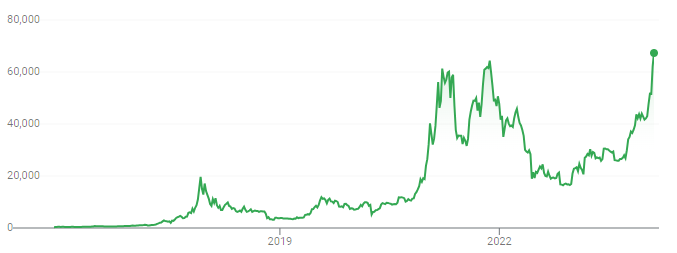
In 2003, an acquaintance came in to see me with a very unusual request. He wanted to invest some of his money, and he had an idea that had never occurred to me before.
No, it wasn’t a “hot stock” in a new company. Nor did he want to put some money into a friend or family member’s business.
He wanted to invest in Iraqi currency.
Remember, the Iraq War had just begun earlier that year. My friend had seen a news report on how the dinar – Iraq’s currency – was plunging in value. That gave him an idea. Why not buy as much dinar as we could in case it ever went back up again?
When it comes to investing, there’s no such thing as a stupid question. It’s never a bad idea to research whether something is feasible or not. I was happy my friend wanted my opinion! The problem, in this case, was that it wasn’t really investing.
It was speculating.
The reason I bring this up is because now, over twenty years later, many investors are wondering about a different form of currency: Cryptocurrency. You’ve probably seen headlines that bitcoin, the oldest and most famous form of crypto, has recently hit a new all-time high. So, you may be wondering: Is crypto a good investment? Why or why not? How do you do it? For that matter, is it really investing at all?
These are all good questions. So, in this blog post, let’s answer them!
What does it mean to “invest in cryptocurrency” and how do you do it?
These days, the term “cryptocurrency” has become a bit of a misnomer. Why? Because bitcoin and its younger cousins are rarely used to buy goods and services. This is partly because most of the population doesn’t own any bitcoin. Another reason is that the majority of businesses still do not accept it.
But the most important reason is this:

This chart shows how the price of bitcoin has changed over time. (The y axis shows the price of a single bitcoin in US dollars.) At different points in its history, it has skyrocketed in value and then plunged again. In other words, bitcoin is extremely volatile. Any shop or restaurant that posted its prices in bitcoin would likely have to change the numbers every day! And for those who own bitcoin, it simply doesn’t make sense to spend it on Monday when it might be worth hundreds of dollars more on Tuesday.
That volatility is also what makes bitcoin so alluring – and so risky – as an investment.
These days, most people don’t think of bitcoin as a replacement for traditional money. Instead, they think of it as a place to store their money — in the hopes that it will be worth even more when they decide to either spend or sell it later. In other words, bitcoin has become a type of asset.
The traditional way to invest in bitcoin and other cryptocurrencies is to buy it directly. You create an account with a cryptocurrency exchange website, decide how much you want to buy, and place your order. Typically, you would pay with traditional currency via a credit or debit card, just like any other online purchase you normally make. Once the purchase is complete, your cryptocurrency is held in a digital wallet. Most investors then simply hold onto their bitcoin, hoping the price will rise far above what they paid for it.
Recently, however, the government approved a new way to invest: Bitcoin ETFs.
Bitcoin ETFs are a type of exchange-traded fund. This is where multiple investors pool their funds together specifically to buy bitcoin. In this case, the individual investors do not own any bitcoin; rather, the cryptocurrency is owned by the fund itself. The investors own shares in the fund, which rise or fall in value as the price of bitcoin does.
The advantage to an ETF is that it enables investors participate in any rise to the value of bitcoin without having to deal with the risks of storing it themselves. (Bitcoin wallets can be hacked or even locked by ransomware, preventing you from accessing your digital money.)
Another advantage to ETFs are that they make it financially easier to add bitcoin to your investment portfolio. Bitcoin can sometimes be so expensive – as it currently is now – that it requires tens of thousands of dollars to own even one. As of this writing, one single bitcoin is currently worth well over $60,000. (While many cryptocurrency exchanges permit you to own fractions of bitcoin, even those can be prohibitively expensive.) With an ETF, you are buying shares in the fund, and those shares are, by comparison, much lower in price.
There are other potential ways to invest in bitcoin, but these are the two most important. Which leads us to the question:
Is bitcoin actually a good investment?
The answer, as with all types of investments, is: “It depends.”
That may seem like fence-sitting, but it’s not. With investing, there’s simply no one-size fits all approach. Here at Hudock Capital, we always base our investment recommendations around each person’s individual needs, goals, personality, and ability to take on risk. We don’t just stick people into the same box and hope they fit.
That said, there are some definite pros and cons to investing in bitcoin that everyone should consider.
The two pros are simple: Diversification and high growth potential.
As bitcoin is a separate asset class, allocating a portion of your portfolio to it can be a potential hedge against volatility in the stock market. However, it should be noted that bitcoin has fluctuated in terms of how correlated it is to stocks. Sometimes, the movement of bitcoin and stocks have been surprisingly similar. Other times, they have gone in nearly opposite directions.
But it’s the potential for growth that makes investing in bitcoin so enticing.
Make no mistake: History has shown that bitcoin can skyrocket in value. Take a look at the chart again:

Over the last year alone, bitcoin has gone up over 146.1%1 in value. (Compare that to the S&P 500, which rose around 33.56%1 over the same period.) This is largely because of ETFs, which have opened the door for a legion of new investors, including many financial institutions. Since January, investors have poured over $7 billion into various ETFs, which has helped drive up the price of bitcoin to new highs.2
So, if you purchase bitcoin at the right time, it can certainly lead to a huge return.
If you buy at the right time.
As you can see, bitcoin has risen sharply four times in its history. Three of those four were followed by a precipitous fall. (We are currently in the middle of the fourth rise.) To make significant money from investing in bitcoin, you would have to buy before or very early in a spike, and then sell before or very early in a decline. Bitcoin, as we’ve seen, is incredibly volatile because it’s vulnerable to all sorts of risks. Some of those risks – like supply and demand, the overall economy, etc. – are common to stocks and bonds, too. But others are more specific to bitcoin. Here are just a few:
- Fear of regulation. Bitcoin is largely unregulated and decentralized. Should the government decide that more oversight is needed, the price of bitcoin could fall.
- Negative press. In the last few years, the crypto industry has seen its fair share of corruption, criminality, and poor financial decisions, leading many exchanges to shut down or go bankrupt. Whenever this happens, it tends to affect the price of bitcoin.
- Hype cycles. Bitcoin is often hyped by its advocates. Sometimes, that hype can drive up the price…but when the hype dies, it can take the price down with it.
Over the last decade, there have been many instances where pundits have declared the “death of bitcoin”…only for it to rise in popularity again. Similarly, there have been an equal number of declarations that “bitcoin is the future”…only for that future to never arrive. Bitcoin investors, therefore, are vulnerable to their own forms of risk: FOMO, and panic.
FOMO, or the “fear of missing out,” often prompts investors to take on far more risk than they are financially able to withstand because they are afraid of getting left behind and wishing they had acted. Panic, meanwhile, occurs when investors see their investment rapidly falling in value, and then cash out to avoid further pain.
Put both these together and you have a classic case of “buying high and selling low.” The exact opposite of what any investor wants…but a scenario that is quite common with bitcoin.
When all is said and done, bitcoin is alluring, but extremely unpredictable and unreliable. Which brings me back to Iraqi dinar…and the difference between investing and speculating.
Investing vs Speculating
Investing is when you allocate money to a venture with a reasonable expectation of returning a satisfactory profit. That expectation, in turn, is based on:
- Detailed analysis.
- An understanding of how much risk is involved.
- Calculating whether that risk is something you can afford.
- A commitment to holding your investment for the long-term.
Speculation, on the other hand, is when you allocate money in the hope that it will return a massive profit despite a high probability of failure. This difference in risk – an acceptable risk versus a potentially catastrophic one – is a critical distinction. In other words, speculation is essentially gambling. Whether in Iraqi currency or cryptocurrency, it’s relying on serendipity instead of strategy.
Make no mistake: Speculation can be potentially lucrative. Unfortunately, it’s more likely to be devastating. And it should never be done with money you can’t afford to lose.
Do we invest in bitcoin here at Hudock Capital?
Because of bitcoin’s volatility, and because so much of its value is derived from speculating rather than investing, we typically do not recommend bitcoin to our clients. Most of the people we serve are saving for their long-term goals. Retirement. Starting a business. Furthering a cause. Traveling the world. Creating a legacy for their children. Those goals are simply too important to leave to chance, which is why we strive to never take on more risk than necessary.
That said, there is no such thing as a stupid question when it comes to investing. While we don’t view bitcoin as a reliable way to save for your long-term goals, that doesn’t mean we rule it out entirely. We always think it’s worth a conversation! Some people may have the means to allocate a portion of their portfolio to crypto, because the risk of loss is acceptable for their situation. And, as bitcoin matures, it may prove to be less volatile in the future.
Investors have many asset classes and investment options to choose from. At Hudock Capital, we believe that financial planning is the process of choosing the right options for you. The decision should be based around your wants, your needs, your risk tolerance, your tax situation, and your personality. So, if you ever have questions about which asset classes make the most sense for you – including bitcoin! – then let’s have a discussion. Unlike most things in life, the price of a second opinion is truly free…which, in a way, makes it priceless.
We are always here to answer your investment questions and serve your financial needs. Please contact us if you ever need help…or if you simply want to chat!
Happy springtime! — Michael Hudock
1 Bitcoin and S&P 500 returns calculated based upon the spot price of Bitcoin and close price of the S&P 500 on March 18, 2023. Source, Yahoo Finance.
2“Bitcoin hits record high. Here’s what’s driving up the price.” CBS News, https://www.cbsnews.com/news/bitcoin-price-stock-cryptocurrency-etf-approval/
